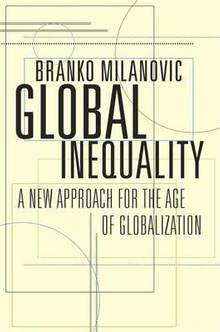Global Inequality
Branko Milanovic
Éditeur : HARVARD UNIVERSITY PRESS
ISBN papier: 9780674737136
Parution : 2016
Code produit : 1322585
Catégorisation :
Livres /
Gestion /
Économie /
Mondialisation
Formats disponibles
| Format | Qté. disp. | Prix* | Commander |
|---|---|---|---|
| Livre papier | En rupture de stock** |
Prix membre : 49,46 $ Prix non-membre : 54,96 $ |
*Les prix sont en dollars canadien. Taxes et frais de livraison en sus.
**Ce produits est en rupture de stock mais sera expédié dès qu'ils sera disponible.
Description
One of the world’s leading economists of inequality, Branko Milanovic presents a bold new account of the dynamics that drive inequality on a global scale. Drawing on vast data sets and cutting-edge research, he explains the benign and malign forces that make inequality rise and fall within and among nations. He also reveals who has been helped the most by globalization, who has been held back, and what policies might tilt the balance toward economic justice. Global Inequality takes us back hundreds of years, and as far around the world as data allow, to show that inequality moves in cycles, fueled by war and disease, technological disruption, access to education, and redistribution. The recent surge of inequality in the West has been driven by the revolution in technology, just as the Industrial Revolution drove inequality 150 years ago. But even as inequality has soared within nations, it has fallen dramatically among nations, as middle-class incomes in China and India have drawn closer to the stagnating incomes of the middle classes in the developed world. A more open migration policy would reduce global inequality even further. Both American and Chinese inequality seems well entrenched and self-reproducing, though it is difficult to predict if current trends will be derailed by emerging plutocracy, populism, or war. For those who want to understand how we got where we are, where we may be heading, and what policies might help reverse that course, Milanovic’s compelling explanation is the ideal place to start.























